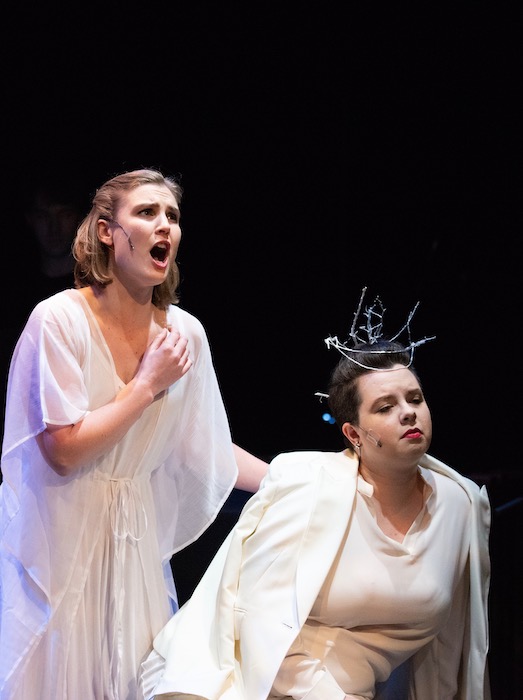Fringe Opera fetes rising composer Cerrone with “Love Wounds”
Christopher Cerrone is one of the hot composers of the moment. Among several high-profile commissions, Third Coast Percussion just debuted his newest work, Meander, Spiral, Explode, with the Civic Orchestra last week. The Chicago-based percussion quartet also presented an all-Cerrone program in New York in 2018 as part of the Miller Theater’s Composer Portrait series
Chicago Fringe Opera is getting in on the Chris Cerrone bandwagon with its current production, “Love Wounds.” Copresented with the instrumental sextet Latitude 49, this miscellany of Cerrone works from 2011 to the present opened Friday night at Stage 773.
If the evening overall proved rather mixed, it did bolster one’s first impression of Cerrone as a gifted composer with a distinctive and appealing voice.
Though there was no conscious thread uniting this assemblage of vocal and chamber works, in curating the program with his colleagues, Cerrone said he realized that much of his music—and nearly all of the works on the program— had to do with the pain and pleasure (but mostly pain) of love, hence the title.
The evening led off with Double Happiness, a five-movement work for piano and percussion (originally electric guitar, percussion and electronics) inspired by a summer the composer spent in Umbria, Italy.
Cast in five sections, the music proceeds from spare pointillist chords (“Self Portrait Part One”) from the amplified baby grand piano —well assayed by Jani Parsons who was stellar all night— and soon joined by shimmering high percussion (the equally excellent Chris Sies). Atmospheric widely spaced passages yield to faster sections and the two alternate, closing in a calm yet peaceful solace (“New Year’s Song (for Sarah)”).
The performance of Double Happiness also had a visual component. Dancer Enid Smith partnered with the musicians, her flowing, sinuous movements lending a graceful androgyny to the proceedings while always closely attuned to the shifting music. (When Smith was lying on the floor, however, with the steeply raked seating in the tiny venue her gestures were only visible to the first two rows.)
Smith also collaborated with Parker and violinist Timothy Steeves in the first movement of Cerrone’s Violin Sonata (2015). A furious violin moto perpetuo leads off and here Smith’s dancing turned more angular and agitated as the repetitive Glassian figures are taken up by the piano, which eventually segues into a more calming chorale-like theme.
Cerrone’s two song cycles provided the highlights of the evening. In addition to benefiting from two excellent female singers, both works displayed the inherent vocal quality of Cerrone’s music with its long, graceful lines and lightly melancholic expression.
I will learn to love a person was written in 2013 on poetry by Tao Lin. The texts deal with relationships in five spare settings that alternate poignancy, anger, humor and sadness, often with repeated words and phrases. Lin’s text-messaging like stanzas were made manifest in the staging with soprano Alex Salas at one point seated in the darkness illuminated only by the glow of her laptop computer.
The barefoot Salas has a natural and appealing voice and presence. The young soprano made this five-song cycle into a uniquely compelling monodrama with crystal-clear enunciation even within the occasional hectoring verbosity of Lin’s texts. Her voice is pure and lovely in tone and even throughout its range, easily finessing Cerrone’s sudden stratospheric leaps.
The only issue with the performance was the amplification for both singer and piano (used throughout the program for all voices and instruments). While mostly discreet, the high notes proved piercing at times and the volume was fitfully fierce. Is amplification needed at all in such a compact space?
Bridget Skaggs was an equally engaging soloist in Cerrone’s more concise Naomi Songs (2015). Here Bill Knott’s simple, conversational poetry proved an especially fine match for Cerrone’s music. In these epigrammatic slices, Skaggs’ warm and plaintive mezzo provided consistently affecting advocacy, touchingly so in “When Our Hands Are Alone.” Here the ever-present Smith’s shadowing presence proved more intrusive.
The largest work of the night was Cerrone’s one-act opera All Wounds Bleed, which gives the program its theme and adapted title.
Written in 2011 and newly scored for sextet, Cerrone’s chamber opera is a kind of Cliff Notes version of the fable of Echo and Narcissus, cast in a few short scenes and running just under thirty minutes.
This is the only work of the night which seemed to suffer from the room; the three singers and director Susan Payne O’Brien did what they could within the microbial performing area but the cramped quarters served to exacerbate the didactic and stilted dramaturgy. The opera is also the most pessimistic work of the program on the subject of love: As the final words put it, “We are all fools. All wounds bleed.”
Still, even with its debits, Cerrone’s writing is strikingly assured in his first opera—fluent and melodic with a visceral, yearning quality that is very compelling (suggesting Gorecki at times).
The three principals were all solid. Mezzo Claire DiVizio made a formidable Hera, and tenor and Fringe regular Jonathan Zeng was the ardent Narcissus. Leigh Folta proved a standout, acting naturally and displaying an agile soprano that could vault up to top notes with no strain. Fringe music director Catherine O’Shaughnessy provided her usual alert, firmly focused conducting.
The one outright clinker of the evening was the world premiere of Why Was I Born Between Mirrors? The mirror theme made this work for sextet an apt prelude to the opera. The music moved from minimalist piano to broader and grander expression, and was well played by the Latitude 49 members. But the piece was undone by the gimmicky loud breathy accents for the wind instruments, which grew more exasperating with each reappearance.
“Love Wounds” runs through May 25 at Stage 773. chicagofringeopera.com
Posted in Performances





